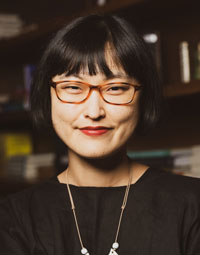![]()
Seoul, South Korea makes Beverly Hills look like a one-stoplight town when it comes to the beauty rat race, and it’s getting more intense every year. Elise Hu spent four years in South Korea as NPR’s bureau chief, and during her tenure there, the K-beauty industry tripled to become a $10 billion industry. South Korea is home to more than 7,500 cosmetic and skincare manufacturers, and K-beauty has staked its claim as the future of skin care.
Author photo by Emily Cummings
Seoul, South Korea makes Beverly Hills look like a one-stoplight town when it comes to the beauty rat race, and it’s getting more intense every year. Elise Hu spent four years in South Korea as NPR’s bureau chief, and during her tenure there, the K-beauty industry tripled to become a $10 billion industry. South Korea is home to more than 7,500 cosmetic and skincare manufacturers, and K-beauty has staked its claim as the future of skin care.
With products that promise pore-less perfection, South Korea’s $10 billion beauty industry is a decade ahead of any other country in innovation and heralded by many industry professionals as the best when it comes to products, regimen, and end-results. Riding the pop culture “Korean wave” and marketed by K-pop superstars and global brands, K-beauty promises flawless skin and a soothing multi-step routine. You’ll find K-beauty products in any city around the world, and in the US, the biggest importer of K-beauty behind China, you can take your pick from hundreds of brands at stores from Nordstrom and Bloomingdales to Sephora and Target. But how did K-Beauty become the darling of the global skincare industry? And does the trend stop at creams and toners? Or are we in an appearance revolution that will permanently transform our faces and bodies towards a more aesthetically pleasing sameness?
Elise Hu, NPR host-at-large and the host of TED Talks Daily, asked herself those questions after living and working in Seoul, the heart of the K-beauty industry. She delivers an audacious, journalistic exposé of the booming industry from the ground up in Flawless: Lessons in Looks and Culture from the K-Beauty Capital. In the book, Hu explores K-beauty’s undeniable success and shines a much-needed light on the darker ramifications of the impossible standards and pressures that drive its growth and their effects on women in a looks-obsessed patriarchy.
In a conversation with Hannah Bae, Elise Hu discusses her book and her experience in Korea.
Flawless: Lessons in Looks and Culture from the K-Beauty Capital will be available for sale during the event via Yu & Me Books.
with Elise Hu
Tuesday, May 23, 2023 | 6:30 PM (EDT)
The Korea Society
350 Madison Avenue, 24th Floor
New York, NY 10017
About the Speaker:
Elise Hu is a correspondent and host-at-large for NPR, the American news network, and since April 2020, the inaugural host of TED Talks Daily, the daily podcast from TED that’s downloaded a million times a day in all countries of the world. For nearly four years, she was the NPR bureau chief responsible for coverage of North Korea, South Korea, and Japan. Her work has earned the national DuPont Columbia, Edward R. Murrow, and Gracie awards, along with a Gannett Foundation Award for Innovation in Watchdog Journalism. She lives in Los Angeles with her three daughters.
About the Moderator:
by Arin Sang-urai @photojuice
Hannah Bae is a Korean American freelance journalist, nonfiction writer and illustrator who is at work on a memoir about family estrangement and mental illness. She is the 2020 nonfiction winner of the Rona Jaffe Foundation Writers’ Award and a 2021 and 2022 Peter Taylor Fellow for The Kenyon Review Writers Workshops. You can find her work in anthologies such as Our Red Book: Intimate Histories of Periods, Growing & Changing and (Don’t) Call Me Crazy: 33 Voices Start the Conversation About Mental Health and online at Asian American Writers' Workshop's The Margins, Catapult, The Washington Post, The San Francisco Chronicle and other outlets.







